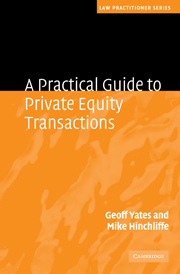Book contents
- Frontmatter
- Contents
- List of figures
- Foreword
- Preface and acknowledgments
- Table of cases
- 1 An introduction to private equity
- 2 The deal process and preliminary matters
- 3 Transaction structures and deal documents
- 4 Acquisition issues
- 5 Equity documentation
- 6 Debt funding
- 7 Employment-related issues
- 8 Pensions
- 9 Tax on private equity transactions
- 10 Public-to-private transactions
- 11 Living with the investment
- 12 Secondary buyouts
- 13 Exits
- Index
5 - Equity documentation
Published online by Cambridge University Press: 04 May 2010
- Frontmatter
- Contents
- List of figures
- Foreword
- Preface and acknowledgments
- Table of cases
- 1 An introduction to private equity
- 2 The deal process and preliminary matters
- 3 Transaction structures and deal documents
- 4 Acquisition issues
- 5 Equity documentation
- 6 Debt funding
- 7 Employment-related issues
- 8 Pensions
- 9 Tax on private equity transactions
- 10 Public-to-private transactions
- 11 Living with the investment
- 12 Secondary buyouts
- 13 Exits
- Index
Summary
Introduction
In this chapter, we will consider the principal equity documents that form part of a relatively standard buyout structure. Broadly similar documents would be used in other private equity transactions (for example, in a secondary or on a public-to-private transaction, tailored to reflect the particular differences inherent in such a deal). For this reason, the general overview set out in this chapter should also be considered in the context of those transactions.
This chapter will focus on the two key equity documents, namely the investment agreement and the articles of association of Newco. It will explain the reasons why there are two documents, and the key terms found in them in the context of the relationships between the different parties and the overall investment. It also includes comments on three key ancillary documents, being the equity offer letter or termsheet, the investment disclosure letter and the loan note instrument. The service agreements that govern the relationship between Newco and the managers in their capacity as employees are considered in chapter 7.
Equity offer letter
The equity offer letter (sometimes referred to as the equity termsheet) sets out, in a non-binding form, the key terms of the equity funding offer. It is usually written by the private equity investors to the managers and/or to Newco, and in effect provides a template for the drafting of the principal equity documents (in the same way that the heads of terms agreed with the seller(s) will provide a template for the acquisition agreement).
- Type
- Chapter
- Information
- A Practical Guide to Private Equity Transactions , pp. 114 - 169Publisher: Cambridge University PressPrint publication year: 2010

